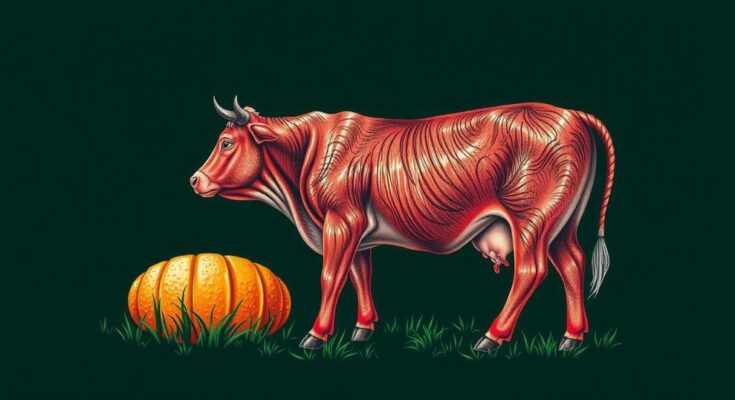A recent study indicates small reductions in meat production in wealthier nations could eliminate 125 billion tons of CO2 from the atmosphere, surpassing recent global fossil fuel emissions. This reduction would allow for ecological restoration by converting grazing lands back to forests, leading to significant carbon sequestration benefits.
Recent research suggests that even modest reductions in meat production, specifically in affluent countries, could substantially mitigate climate change effects. A decrease of approximately 13% in total beef production could potentially lead to the removal of 125 billion tons of carbon dioxide from the atmosphere—an amount that surpasses the total global fossil fuel emissions from the past three years. By reducing the land allocated for cattle grazing, regions could revert to forested areas, which naturally absorb CO2, allowing for significant ecological restoration. Matthew N. Hayek, a lead researcher at New York University, articulates the potential impact of these reductions, stating, “We can achieve enormous climate benefits with modest changes to the total global beef production.” The study, published in the Proceedings of the National Academy of Sciences (PNAS), points out that many pasture regions in wealthier nations are unsuitable for efficient cattle grazing, thus they are prime candidates for recovery. In contrast to lower-income regions, affluent countries can strategically reduce beef output while increasing production efficiency elsewhere. The researchers indicate that transitioning livestock grazing from previously forested lands could result in significant carbon sequestration, with the potential for up to 445 gigatons of CO2 removal by the century’s end. This transformation highlights the capacity of natural forest restoration to serve as a complement to direct emissions reductions. Hayek notes, “This approach would still allow livestock grazing to remain on native grasslands and dry rangelands,” showcasing a balanced view of food production and ecological stewardship. Employing advanced remote sensing technology, the study assessed pasture productivity’s role in identifying optimal areas for effective policy interventions aimed at reducing beef production. It emphasizes that regrowth can occur naturally in many areas, but additional human assistance may enhance restoration in severely degraded environments. The urgency of these findings is critical as countries strive to meet international climate agreements. Ecosystem restoration via the recovery of converted pasturelands could be essential to achieving these goals. Hayek concludes, “Our study’s findings could offer paths forward for policymakers aiming to address both climate mitigation and food security concerns.” This calls for swift and strategic actions in addressing both ecological integrity and sustainable food production needs.
Climate change has been a pressing global challenge, with significant contributions from greenhouse gas emissions resulting from various sectors, including livestock production. The scientific community has long advocated for reductions in meat consumption and production, particularly in wealthier nations known for higher per capita consumption. This shift is vital for reducing agricultural land use and improving carbon sequestration through reforestation. As forests restore, their ability to absorb carbon dioxide increases, presenting a dual opportunity for both environmental sustainability and food production efficiency.
In summary, the research underscores that even minimal adjustments in meat production in affluent countries can yield substantial climate benefits. By prioritizing the restoration of previously forested areas currently used for livestock grazing, significant carbon sequestration is possible. Moreover, it is evident that strategic policies can facilitate a balance between environmental sustainability and food security, particularly important as nations aim for ambitious climate objectives in the coming decades.
Original Source: www.eurasiareview.com




